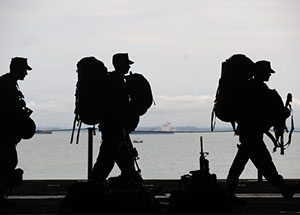Military Secrets to Creating a Culture of Leadership
By Dr. Bobby Sanchez
How does the military produce great leaders? My experience as a commissioned officer and U.S. Army Ranger is that they do so by nurturing the character, traits, and competencies of service members from the moment they first report to duty until the day they depart military service. While military service is very different than other career fields, it is also very similar to most businesses in the U.S. who invest in and rely heavily on human capital for producing, or providing a product or service. In the case of the military, the greatest competitive advantage is found in the people who comprise the total force, particularly their selfless service and dedication to a cause greater than themselves as evidence by the oath to protect and defend the Constitution of the United States. This holds true from the newest Private attending basic training, cadets entering into the U.S. military academies, to service members preparing for retirement from active duty. This solemn oath, in effect, provides a common purpose and a sense of duty with each service member viewing their commitment to duty as a moral responsibility to the nation and to each other.
In the military, everyone is considered to be a leader, first to themselves, and then to others. The ability to lead ourselves, while appearing seemingly simple on the surface, can be one of the greatest challenges for any individual aspiring to lead others. The competencies required to lead ourselves are comprised of our capacity for self-management, or demonstrating self-control and ability to manage our time and priorities. Other competencies critical to leading ourselves include personal accountability, or the ability to be accountable for our personal actions, flexibility, resiliency, and goal achievement. In each of the military services, leadership competencies and traits required for leading others are also shaped through a series of well-planned educational, individual, and collective training programs far more expensive and demanding than the level of training provided by other government organizations and for-profit industries. Each of these leadership development programs promote teamwork, hone interpersonal skills, mold personal courage, and shape empathy.
One of the unique approaches used by the military in developing leaders is to have each individual learn the job of the person two levels above them. This is so when a leader is taken out of the fight, the next person in the chain of command can seamlessly assume the position of leader who can no longer carry on the mission. Another unique way in which the military develops great leaders is to give them the responsibility for caring for the family members of servicemembers deployed to combat. While there is an abundance of leadership models to consider, I believe that the best type of leadership comes out of an obligation to serve others.
Our military leaders, while serving in crisis situations where leadership influences the survival or physical well-being of others, must lead in ways which demonstrate selfless service while inspiring and promoting confidence and trust. When members of an organization perceive a leader is putting the needs of others before their own, something transformational occurs throughout the entire unit. In the lingo of leadership theorists, such influence is termed transformational leadership, and it is the dominant style of military leaders. How does the military produce great leaders? They do so by nurturing the character, traits, skills, and competencies of service members each and every day, from the moment they first report to duty to the day the depart military. While it can be challenging to impart a value set that makes leaders aspire to be servants to their followers, the military provides a proven and time-tested model of producing servant leaders for others to follow.


